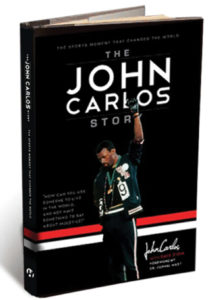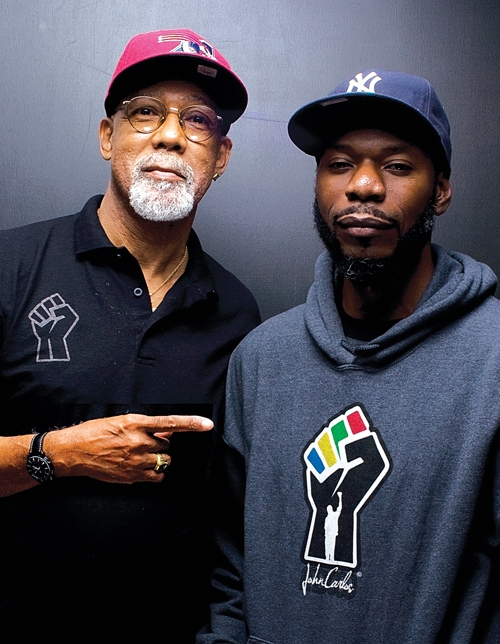Athlete and writer John Carlos inspires change
Mark Stoddart
Contributor

If you don’t know the name, you know the demonstration. If you don’t know the demonstration, you have heard the name: John Carlos.
Dr. John Carlos is known for the iconic Black Power salute that he and fellow African-American, Tommie Smith, made at the 1968 Olympics in Mexico City.
With Tommie Smith capturing the gold medal in the 200-metre dash (in a world record time of 19.83 seconds), and John Carlos graciously claiming the bronze medal (in a time of 20.10 seconds), the stage was set for the monumental gesture and display of unity on the grandest stage in all of sports.
Sharing the winners’ podium with Carlos and Smith was Australian sprinter, Peter Norman, who ran an impressive 20.06 seconds to capture the silver medal.
Initially, both Smith and Carlos planned to bring black gloves to the event, but after Carlos forgot his at the Olympic Village, Carlos wore Smith’s left-handed glove after Australian Peter Norman suggested it—thus the reason behind him raising his left hand on the podium, and not giving the traditional right-handed Black Power salute.
Norman, in support of Smith’s and Carlos’s stance, donned the Olympic Project for Human Rights (OPHR) badge on the podium.
Despite the immense public and media backlash that these athletes faced immediately after their demonstration, the goal and message had been received. It would forever be in the minds of viewers around the world.
A child in 1968, I have always felt an innate and unique connection to Carlos’ generation. Growing up, I idolized the essence and heart of various public speakers, revolutionaries, political and non-political figures who went beyond the call of duty, fought, and spoke out against unjust conditions and inequality towards various races.
On November 17, 2011, I had the wonderful privilege to meet and chat with Carlos and present him with a personalized painting of himself during his public lecture and book signing at York. Carlos is the author of the exceptional book, The John Carlos Story: The Sports Moment That Changed the World.
The sheer excitement, joy, admiration, and star-struck feelings that bestow any individual who encounters their favourite player or actor, had me speechless when I first met Carlos. But after a few minutes of hearing him speak, I realized that this man was “the truth,” and a humble man. For as long as I can remember, Carlos has been one of my heroes and mentors.
Having researched the events of the 1968 Olympics and those taking place in America and around the world at that time, I became more and more fascinated with what Carlos did and what he stood for. I was struck with admiration every time I saw him interviewed on television or whenever I read articles about him or that moment in 1968.
Here was an athlete blessed with an exceptional God-given talent who could have easily become one of the greatest runners in the world. Yet, he realized, at a very young age, that he would not be content with being used, exploited, or subjected to anything he felt was demeaning to himself or to his people. Carlos often stated: “You got 48 hours to do something about this…”
On the grandest stage and in front of millions of people, Carlos and Smith’s raised fists spoke silently to millions of people. They did it without thought of the damage it would cause to their track careers.
According to Carlos’ biography on his website, the International Olympic Committee president Avery Brundage ordered Smith and Carlos be suspended from the US team and banned them from the Olympic Village. Australian winner Peter Norman was dealt with no penalties or repercussions. Yet, all three athletes experienced repercussions of their controversial 1968 Olympic medal ceremony, the most serious of which were death threats against Carlos, Smith, and their families.
 You don’t have to be a superstar athlete or entertainer to make a difference. Carlos follows his belief system first and foremost and that, more than anything else, is what makes him so effective. He is concerned with global human rights of the 99 per cent, not the one per cent.
You don’t have to be a superstar athlete or entertainer to make a difference. Carlos follows his belief system first and foremost and that, more than anything else, is what makes him so effective. He is concerned with global human rights of the 99 per cent, not the one per cent.
From Carlos’ example and continued quest to be a voice for the people, I know that I too can get up in the morning and make a difference. I’ve learned that you have to possess a genuine passion and care for whatever you do in life, regardless of the rewards or consequences that may arise as a result of it.
Meeting Carlos was surreal. His aura and warm presence instantly puts you at ease, making you feel as if you’ve known him your entire life.
When talking to Carlos one can sense that he is eternally young at heart and spirit, and loves life. His face constantly radiates with jubilation. He has a purpose and a passion. It is the people who get up and want to give back to others who truly have the greatest lives.
To have Carlos endorse and validate what I have been doing for so many years only confirmed within myself the reason why I continue to do what I do.

